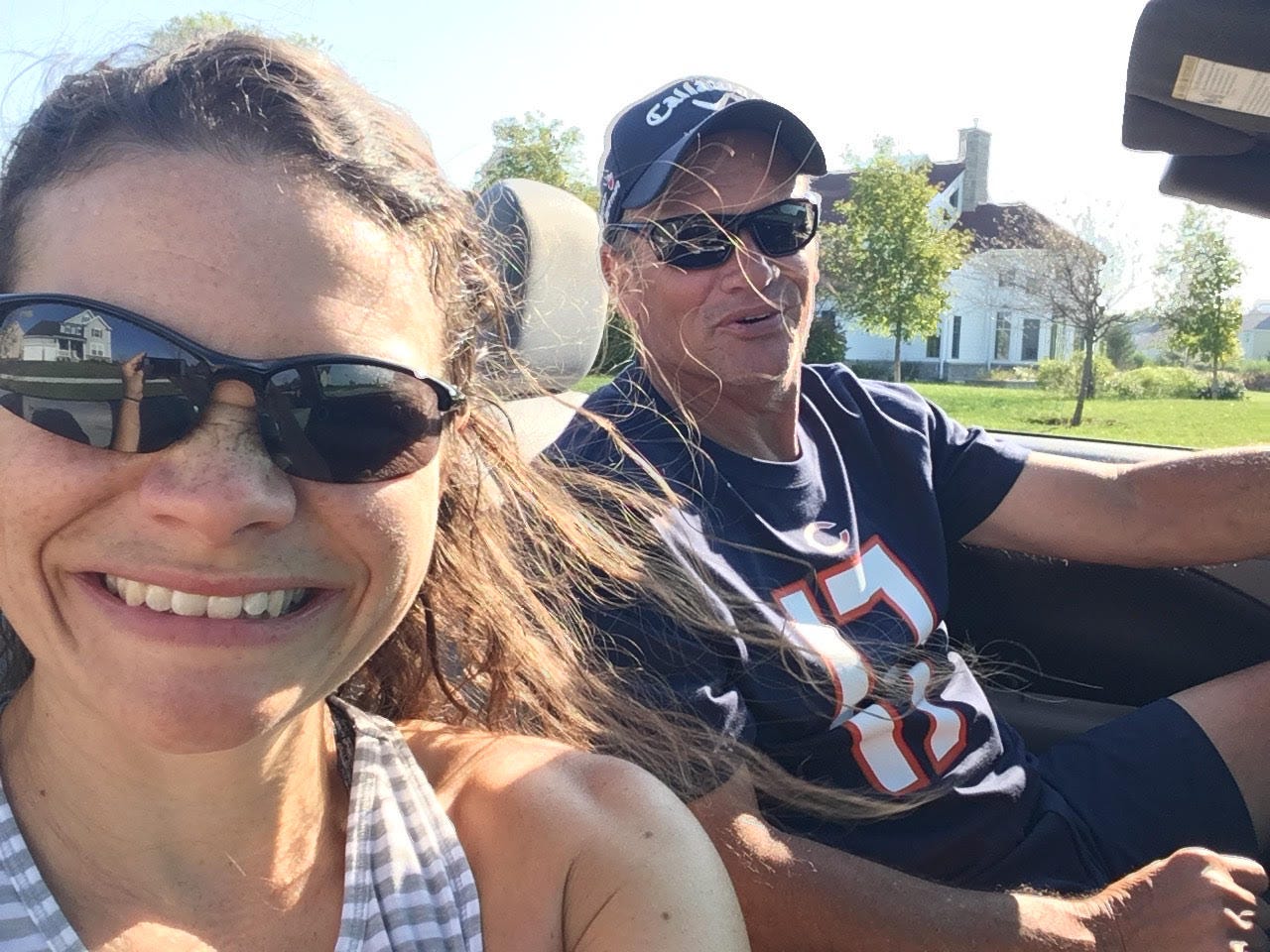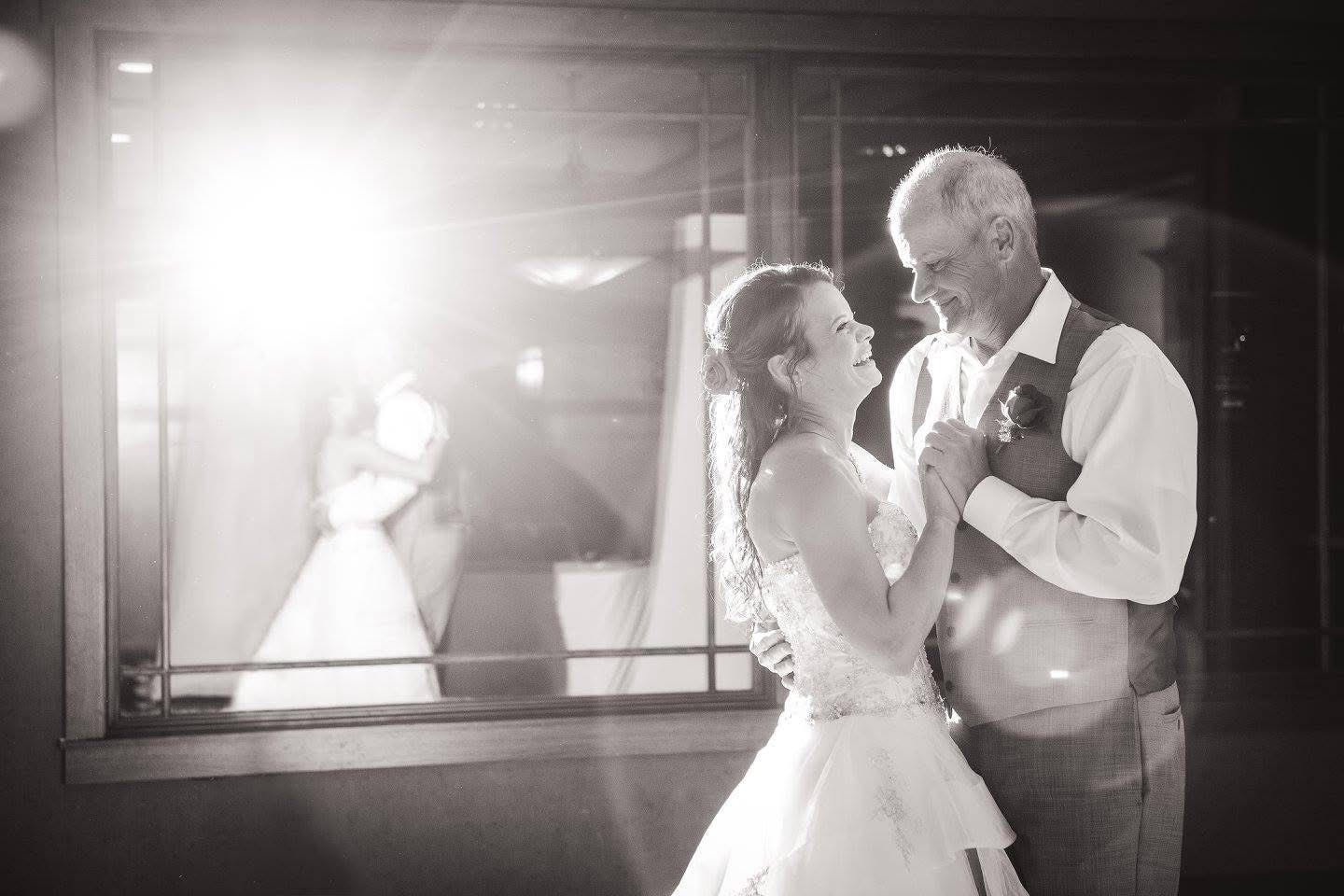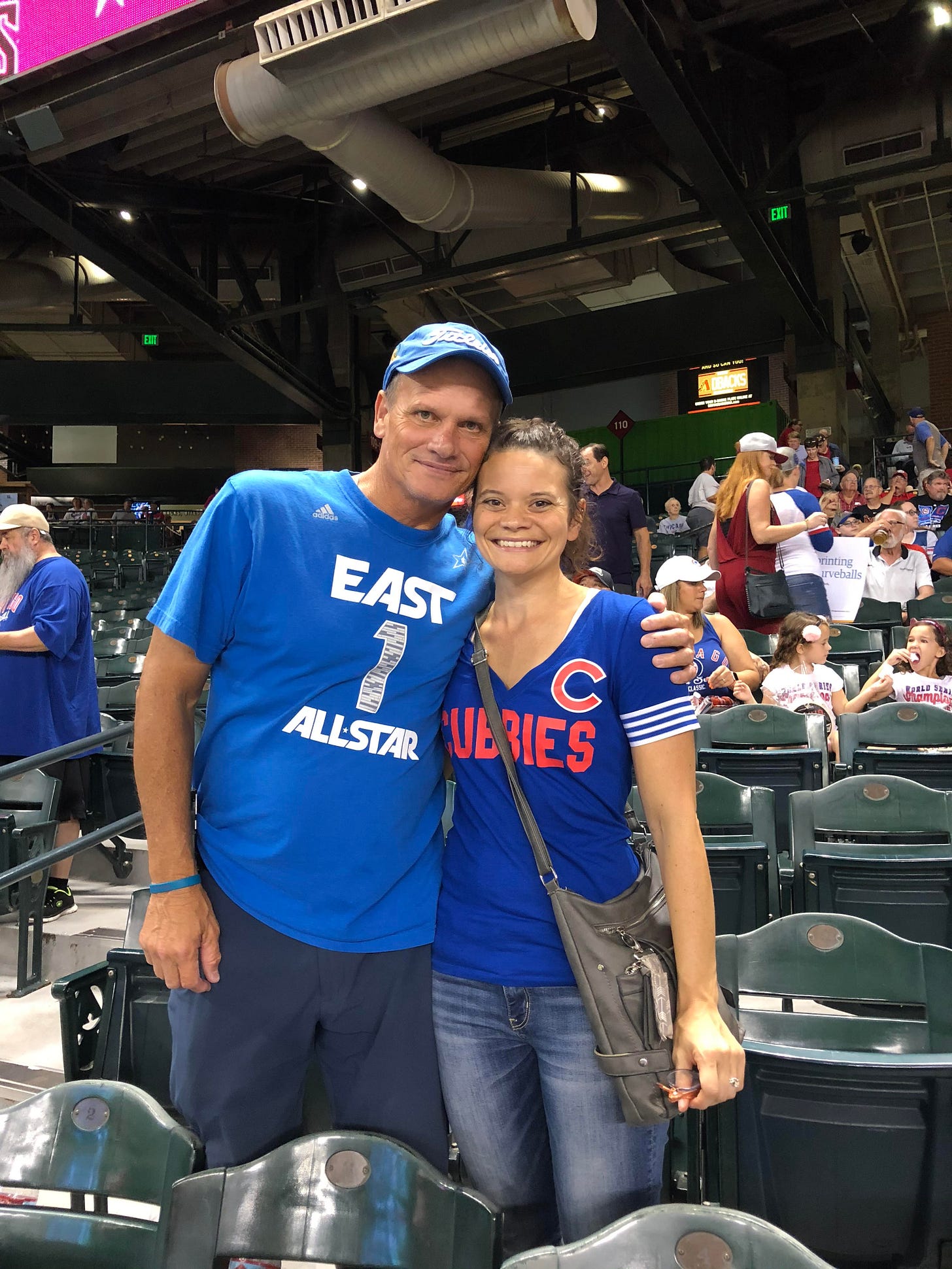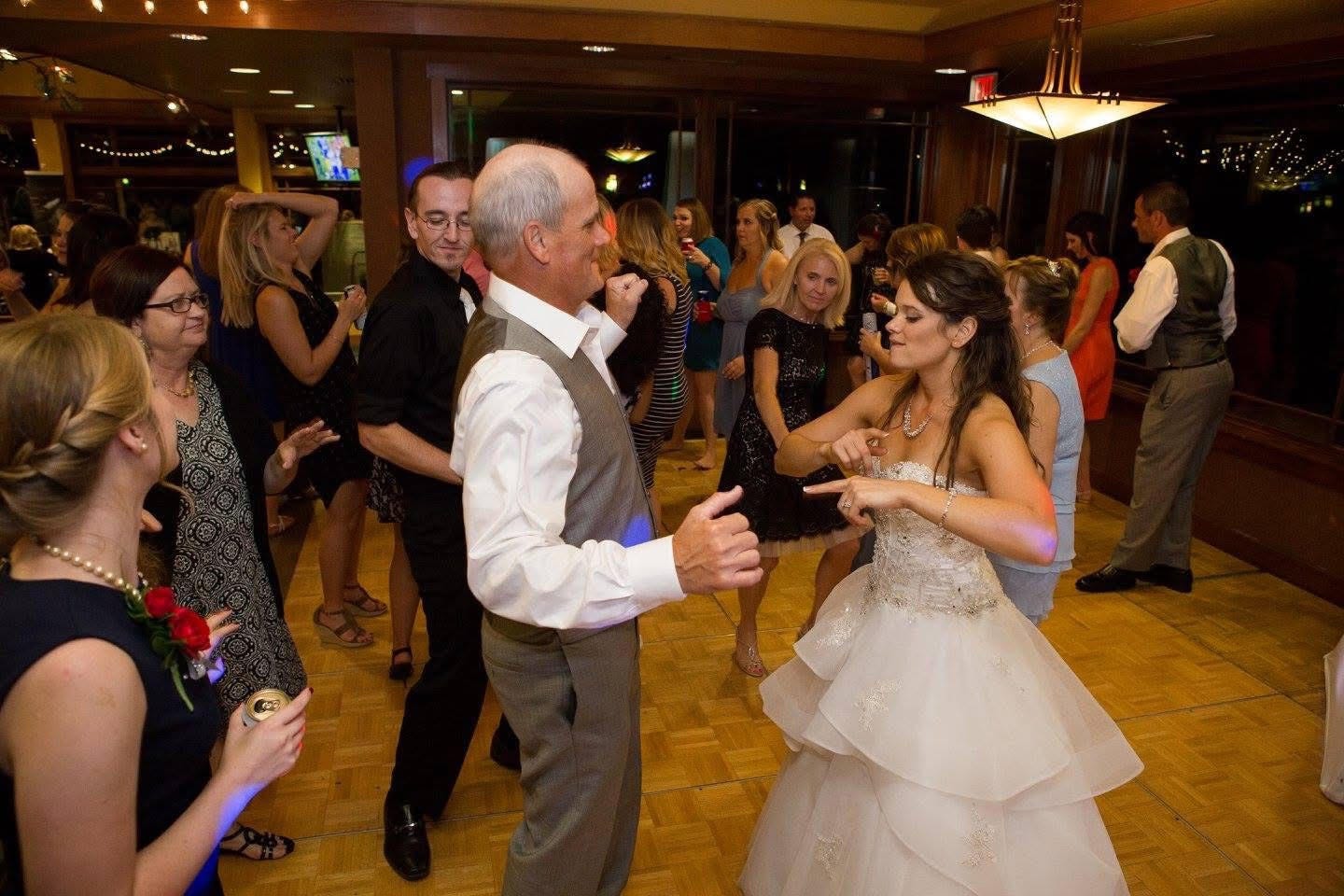My First Prince
Another essay from my book
Last month I shared an essay from my unpublished book about my sweet Grandma Barb, and since people didn’t hit the ground unsubscribin’ I thought I’d share more. If this were to be a beautifully printed out book, this essay would be Chapter 1 after the Introduction. It’s about my dad and all the words of wisdom and nonsense he’s imparted on my over the years. If you know Tom Chalkey, I think you’ll enjoy it.
And if you don’t, you might want to.
This is a different style from what I usually share here, so please let me know if you like it and would like to see more of my essays. I’d love for them to live here. Enjoy!
My First Prince
Princess (one definition): a daughter or granddaughter of a sovereign
Once upon a time in an Illinois hometown, a little girl played Pretty Pretty Princess with her dad and learned how to dream.
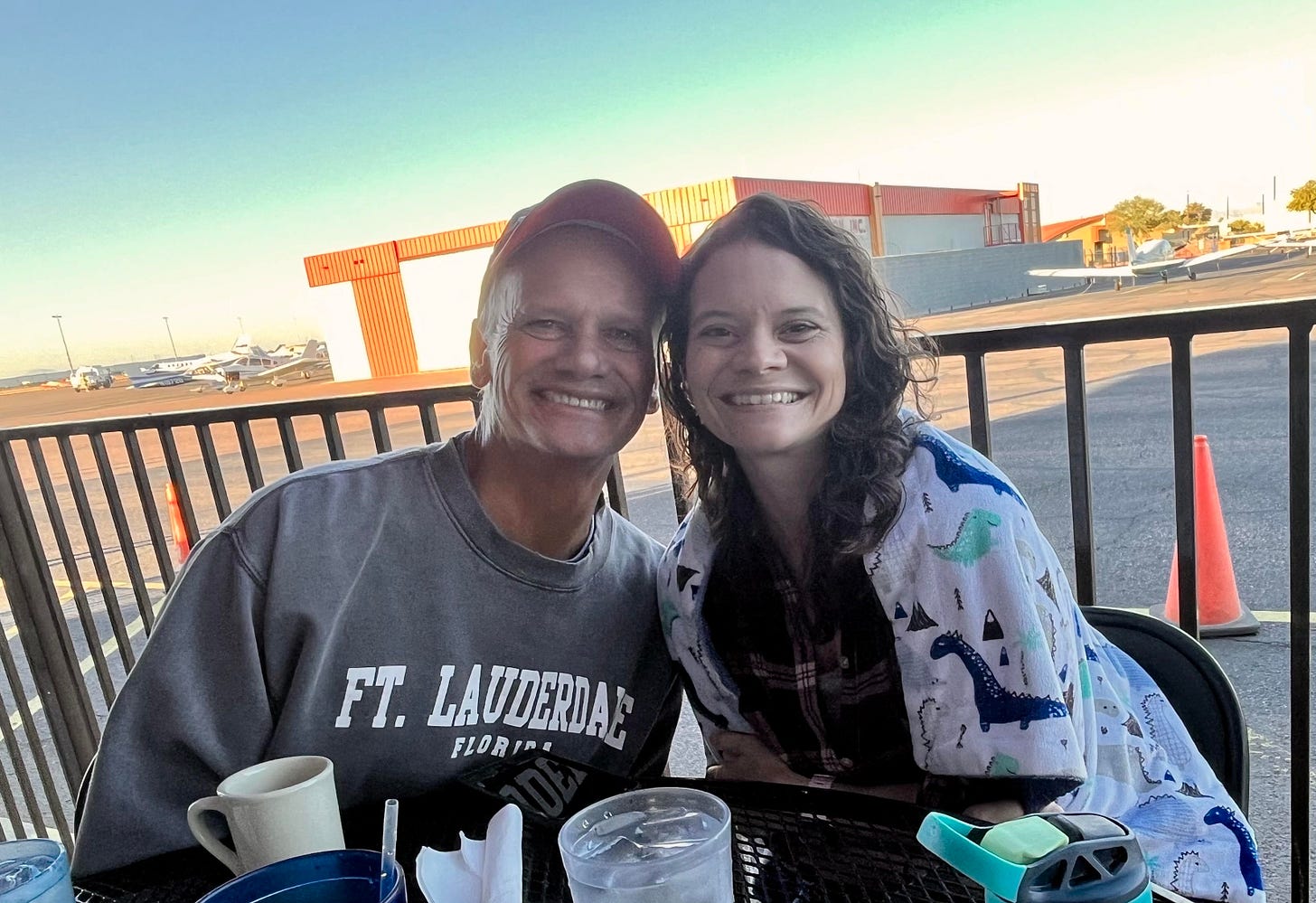
"Did you know your dad here is the best ball player this town has ever seen?"
"Streator hasn't seen a good shortstop since his day."
"Chalks really set the bar around here."
I couldn't tell you which townie it was – Butch, Bugsy, or Creature (their Streator-given nicknames) – but when I was a kid, one or all of them would start out my daily breakfast with my dad by letting me know what a legend Tom Chalkey was – is – in my Illinois hometown. Dad always sat at the furthest corner of the breakfast bar at Buster's, closing himself off to the wall behind him with the sports section of the newspaper. While the townies told me stories, Dad would continue skimming the scores and making funny comments out the side of his mouth that only I could hear – "Don't listen to him, Michelle, he's full of maloo-koo," (a word he still uses to describe someone who's loony).
But the story I grew up on was that my dad – the goofy, meek man who skinned my curly hair back into ponytails before preschool and suggested playing Pretty Pretty Princess nearly every afternoon – was a baseball celebrity in our small town before my brother and I came into the picture.
He played ball at Benedictine College on a scholarship and had major league teams looking at him. What my nine-year-old imagination interpreted from our breakfast conversations was that he had the opportunity to play for the Minnesota Twins, and I thought this was the coolest thing. My dad could have been a major-leaguer!
Instead, Dad worked the night shift as a correctional officer throughout my childhood. He slept during the day and, on my summer breaks from school, I'd play quietly and impatiently with my Barbies while I waited for him to wake up around three p.m., hoping he'd take me to our go-to spot for "breakfast."
Every day at Buster's was the same. The second we got out of the car, I could smell my order emanating out the vents of the sand-colored restaurant. Melted cheese, toasted bread, and greasy French fries had to be all the kitchen made because it was the only aroma my nose took in from the parking lot.
If Dad didn't want to talk to anybody else that day, we'd wait at the hostess stand for a table. "Nonsmoking, Tom?" one of the girls would ask.
He'd turn and look down at me, a little girl swaying back and forth clutching her Babysitter’s Club book. "Do you still smoke?"
"Daaaad!" I'd tuck my chin down, embarrassed, and the hostess would smile at me and roll her eyes at him. It was the same joke every time.
But most days, we'd plant ourselves at the far corner of the breakfast bar. We had an understanding that our dates began with twenty minutes of quiet time – Dad would read the sports section of the paper and I'd happily read whichever Babysitter's Club book I was on, swinging in my bar stool with my legs dangling.
Then we'd signal to Kelli or Lisa or whichever of our regular servers was there that day that she could put our order in. The waitresses all knew my order by heart – grilled cheese, fries, and a Diet Coke – and Dad was either two eggs over easy and toast or the buffet, depending on whether he wanted a piece of chocolate cake that day or not, (the waitress usually snagged him a piece anyway.) The girls refilled his coffee mug every ten minutes, and I'd make stacks out of the accumulating empty creamer cartons.
He'd sip his milky coffee, smack his lips, then use his signature, quirky phrase: “A little strong but good."
While we waited for our food, if the townies weren't hanging around, Dad and I had a deep conversation. Topics I remember coming up the most: Mom, baseball, and my future. He often asked me what I wanted to be when I grew up.
From the time I was nine years old, my answer never changed: "I'm going to be an author." My career dream was formed right there at Buster's, one Babysitter's Club book at a time. I loved getting lost in imaginative worlds and dreaming them up myself.
Dad would look at me, his expression bouncing between serious and silly. "An author." He'd draw a pause before arguing in a calm yet persuasive tone. "And how do you expect to make a living as an author?"
"Oh, easy. I'm going to be a best-selling author, Dad. Just like her." I'd point to the name on my book, Ann M. Martin. "She has over a hundred of these Babysitter's Club books. That's exactly what I'm going to do. Write hundreds of books and be a bestseller and live in a mansion."
He'd shake his head in disbelief. Sometimes he'd bring one of the townies in on the discussion.
"Butch, my daughter wants to be an author. Can you believe that?"
With an impish smile, I’d clutch my book.
The townie would egg us both on. "She must get that brain from her mother."
It was the perfect setup for Dad's real argument. "You are smart like your mother," he'd say. "That's why you should be a nurse like her. Then you actually would make some money. Sweetheart, you'd be set for life. You'd have a great salary and you could find a job wherever you went."
I'd sigh that nine-year-old-girl dramatic sigh and roll my eyes. “Dad, I don't want to be a nurse. I love writing, all I want to do is write. I'm going to be the best, just like you were in baseball."
He'd laugh, then fist-bump me. Dad, who was fist-bumping before it was actually a thing, couldn't deny he was the best ball player in Streator either.
From the time I was nine to nineteen, Dad made the same argument almost word for word. I never understood his push-back. If Dad was good enough to be a major-leaguer, why couldn't I be a bestseller? If he could dream big, why couldn't I?
"I knew your mother wouldn't have married me if I went on to play."
Dad's reason for not going to play for the Twins, as told to nine-year-old Michelle, helped form my second major dream: have an epic love story like my parents.
I was blessed to have grown up in a loving home. From my little-girl eyes, my parents had the perfect relationship. They had met as teenagers at Southside, Streator's baseball field, and Mom had initially wanted nothing to do with Dad. "He was so cocky," she'd tell me in her version of the story. But he charmed her, and they were high school sweethearts. They stayed together through college, got married at twenty-three, and had my brother shortly after. They both started their careers in Streator – Mom working as a nurse at the hospital and Dad a correctional officer at the Sheraton prison about forty minutes away, continuing to either play adult-league softball or umpire baseball games on the side.
I never saw them argue or fight when I was little. In fact, I was more grossed out by their infatuation with one another. Dad thought he was funny playing grab-ass while they cleaned up from dinner. My mom would slap his hand away. "Not in front of the kids!" I would hide my head in my hands and tell Dad how gross he was. My brother Tommy, five years older than me, would laugh and root him on.
My parents' real-life example made me believe in the validity of the nineties’ sitcom love stories I was smitten by as a kid. Saved by the Bell, Boy Meets World, Full House – these shows fed my imagination with far-fetched romance. I lusted over Kelly and Zack finally getting together, over Topanga asking Cory to marry her during their high school graduation, over Steve showing up unexpectedly in the last episode of Full House to take DJ to the prom and their meaty kiss in that show-stopping moment. These iconic couples informed my daydreams, and I began to fill notebooks with my own love stories. Every time a boy said hi to me, I wrote my first name down in my notebook with his last name to see how it looked. The movie in my mind had me meeting someone on the baseball field in high school, getting married after college, and starting a family right away.
These dreams I established as a kid shaped the way I did everything during my adolescence and young-adult life. Choosing to hang out with boys instead of my girlfriends for the night. Imagining every boy I dated (or exchanged glances with) potentially becoming my husband. Majoring in English in college, because what else would a bestselling author study? Moving to Orlando and believing I could get a job writing for Disney, where dreams come true and love stories are abundant.
Perhaps because of Dad's history, I believed I was special, capable of anything, even though he tried his hardest to persuade me to be more realistic. I pursued authordom at every turn and couldn't figure out why he wasn't so excited for me, why he wouldn't let up on me pursuing nursing. I thought it was one of his funny old jokes, but he was caught between encouraging me to dream and ensuring that I kept one foot on the ground.
When I was twenty-four, Mom and Dad visited me in Des Moines, Iowa. Dad and I drove a mile up the road to Papa Kern's, a diner I'd never been to, but it sparked nostalgia for those childhood breakfast dates every time I drove past it. It was about a quarter of the size of Buster's and smelled more like greasy hash browns than melted cheese, but it felt the same. Regulars sat at the breakfast bar chatting up the staff. Dad and I picked a booth, thankfully smoking sections were no longer a thing in restaurants, and he couldn't use that joke anymore. Dad brought a newspaper with him and sifted through it for the sports section. I fired up my Kindle and picked up where I left off on my current read. We both ordered coffees, and I didn't hide my judgment when I watched him pour three creamers and half a shaker of sugar into his mug. I choked down black coffee that tasted like diner.
Twenty minutes later, Dad ordered eggs over easy, hash browns, and a pancake. I ordered eggs and bacon. The waitress topped off our coffee, and Dad and I were transported into our own familiar world.
"How's work going, sweetheart?" he asked.
"I hate it," I replied, unapologetic.
"It sounds like you're set up pretty well though. Good benefits, right?"
"Yeah, I guess, but I'm bored. There's not enough work for me to do. I spend the entire day waiting for 4:30 so I can get home and work on my book."
I was an executive assistant for a school district. The job came with a great salary, incredible vacation and sick time, and a sexy match for retirement from the state.
But none of it mattered to twenty-four-year-old me. I had to become an author. Soon. Ever since those Babysitter’s Club days, nothing had ever held my interest as much as writing stories, dreaming up alternate lives and what-if situations, or processing my own reality through the written word. Nothing lit me up quite like a well-written, resonating book or article or essay. Being an author was the only way I thought I could be the fullest version of myself.
I changed the subject.
“Are you excited about the game later?” I asked. We were going to Principal Park to watch the Iowa Cubs, Chicago's minor league team.
“I'm so excited I didn't sleep last night.” Dad smirked, but I knew how much he loved watching professional baseball. Then he shook his head, more serious, going for a sip of his coffee. “That could've been me, Michelle, maybe if I'd kept my act together.”
“What do you mean? I thought you gave up baseball to be with Mom?”
He laughed and set his coffee mug down. “Yeah, something like that.”
I'd heard different variations of the story over the years, but I liked hanging onto the version I knew from childhood. Dad told me over our diner coffee that he didn't actually make the choice to turn down the Twins. He wasn't picked, and when he got the news, he gave it all up and quit college three months shy of graduating.
Later that day we sat behind home plate and watched a promising young third-baseman named Kris Bryant sink a home run. Dad got up from his seat while Bryant rounded the bases, and like a little kid, stuck his hand out for a high five as the (smokin' hot) player made his way from home plate to the dugout.
Many of Dad's stories changed as I got older. Hell, maybe they were the same and it was my understanding of them that changed. It came out that he and Mom broke up several times before they got married, and when they were twenty-two, she gave him an ultimatum – she was moving to Texas with a friend unless he could give her a reason to stay. Another time at Papa Kern's, he told me that Mom almost left him when they were in their twenties.
I nearly dropped my shitty coffee. “What? When?”
“Oh shit, Michelle.” His voice was so soft, only I could hear him. “When we were your age, we had Tommy already, he was just a year old, and I was out playing ball every night and staying at the bars 'til morning. Your mom was so fed up with me, I was never there. She was ready to throw in the towel.”
“I had no idea,” I said, trying to picture my mom actually packing bags and throwing in the proverbial towel.
He pursed his lips together and shook his head, looking down at the table. Quietly, he said, “If she would have left me, I would have become such a bum like all those other guys we used to see at Buster's. She threatened to leave, and I got my act together. You know, for the most part. Neither of us wanted to put you kids through that. But she used to say, ‘I should have just moved to Texas.’”
Little by little, the fairytale stories of my childhood morphed into grim tales I wasn't sure I wanted to know. What inspired my nine-year-old imagination was all a facade. Getting married young didn't mean you lived happily ever after. Making it big in whatever field was the exception, not something that happens for people from Streator, Illinois.
Part of my past felt so delusional. Did I really think it was a good idea for Topanga to ask Cory to marry her at their high school graduation? What if I would have married the electric guitar-playing metal-head I was with at age twenty-two and started a family with him? We would no doubt be divorced by now.
When I took another executive assistant job at twenty-eight years old with an entry-level salary and no path for moving up, part of me wondered whether I should have listened to my dad and majored in nursing or something else I'd at least find interesting that came with more security. Who was I kidding to think I could just be an author?
When I reflect on these childhood dreams and balk at my embarrassing pursuit of them, I catch myself hardening at the edges. I look around the home I've created for myself as an adult and cringe at some of the princess decor I still hang onto, including a Rapunzel figurine with the quote “Go live your dream” sitting on my writing desk. My wish-list mindset has started molding into the more realistic way my dad saw things.
Being an author was something to dream about but not actually possible for a little girl from Streator.
Being married was incredible, but it was no fairytale.
Years ago, at a friend's high school graduation party, a girl in my class came over to me and said, “Look at your parents over there, they are adorable!” I caught Mom and Dad sitting at the bar, my dad's hand gliding up Mom's leg, and instead of swatting him away she was laughing and looking at him like he was the only person in the room. “They look so in love,” my friend said. Her own parents had divorced a few years earlier.
What if my parents had let their real colors come out? Would I have rather grown up in a home of drama and fighting, even if it meant I'd have more realistic ideals in my adult life?
My mom and dad's marriage came out better because of the rough patches they survived in their twenties. Their sticking together for Tommy and me served even more as a role model for what a strong marriage looks like – imperfect, full of compromise and forgiveness, and, apparently, PDA.
Would I have rather known the truth about my dad's baseball fate when I was dreaming of my own career on that breakfast bar stool? What if I had chosen nursing or a more realistic major in college than English?
What difference would it have made?
I might never have grown up able to dream and believe in the impossible. I might not have become the optimist I am in the workplace, which different bosses have told me is one of my biggest strengths.
I doubt I would have moved to Orlando at age twenty-two with the belief that I could write for Disney. Or audition to be a princess. Without declaring I'd one day be an author, I might never have had the audacity to attempt writing a book, hit publish on a blog post that might not be read by anyone, to submit to publications and put my work out there. Without kissing so many frickin’ frogs, my life would be much more vanilla, and maybe I wouldn't have come to appreciate my husband for the prince he is. I doubt I would have tried out for volleyball in college, traveled to Europe when I had no money, or quit a secure job to try freelancing.
Each one of those things I dared to do led to failure of some sort. It wasn't until I learned the truth about some of those childhood myths that my heart began to harden around these failed adventures.
But I can't deny that all of those failures left me with rich experiences. The biggest lessons I've learned have come from shooting for the stars and falling on my ass. They have led me to a big life.
The facades my family put on were for me. They weren't for nothing. The stories I knew were there for me to have the happiest, most magical childhood possible, and I'm fortunate that it all spilled over into who I became as an adult.
Without those facades, my imagination would have been capped at what's realistic.
My life wouldn't feel so big and sparkly. I wouldn't be the person who believes everything is going to be okay.
#
Dad came to visit me for a week when I was twenty-nine and living in Phoenix. Our latest version of breakfast was a happy hour at a sports bar called Twin Peaks, the Phoenix version of Hooters. (I know, we keep stepping up our dining game.) Our dinner date started out the same as always, except Dad's newspaper was now the ESPN app on his phone and my Babysitter's Club book was my laptop, because I had some writing to do. After fifteen or twenty minutes, we both put our devices away. I ordered a salad to accompany my water and he ordered hot wings and another beer, even though his current beer was three-quarters full. When his beer came, I watched in curiosity while Dad poured pepper into his full glass.
He took a sip, then followed with his motto: "Ahh, a little strong but good." Try as I may, I could never understand this man and his quirks.
We were watching the Cubs play the Arizona Diamondbacks on the big screen. Over beers and wings, the same conversation topics came up, now modified for my twenty-nine-year-old self.
After watching Kris Bryant - now on the Major League team - dig up an impossible grounder, Dad's eyes twinkled. “Man,” he said, followed by a sip of his beer. “Sometimes I just wonder what would have happened if I'd taken it more seriously, you know? Could I have made it?”
I watched him stare at the screen as he said this, his eyes lost in the replay. I was grateful then that this wasn't the story I heard when I was nine, because I've lived my life in a way that I've never had to ask that question.
What do you think? Would you like to see more unpublished essays from my unpublished book? Let me know. Either way, thanks for reading about cool dad.
If you liked this post, check out my other essay: “A Genuine Goddess”



